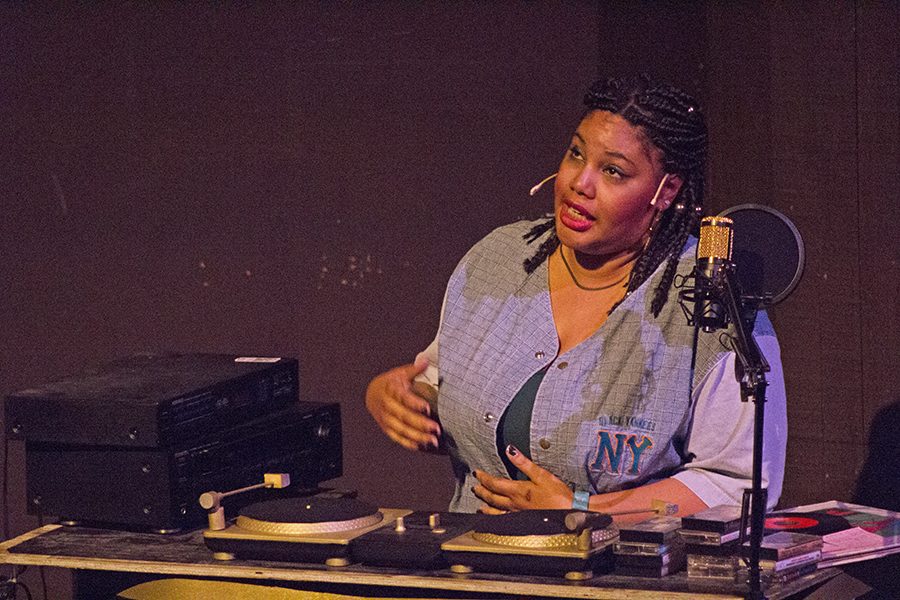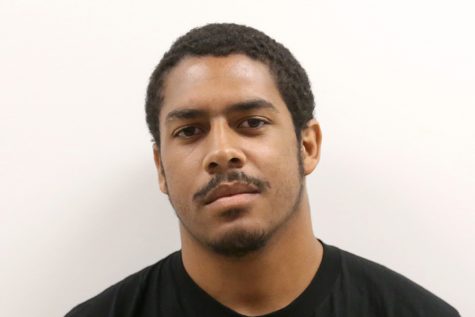Spirit of rhyme drives youth tale
Hip-hop play brings forth humor, potent message
Selector, played by Akilah Kamau, narrates the action in the hip-hop inspired play “How We Got On” in the Knox Center on Thursday. The play continues this weekend.
Nov 14, 2017
Finding a passion to act as an emotional outlet is one thing that teenagers will seek out to aid their struggles.
That outlet can be drawing, basketball, writing — or hip-hop.
“How We Got On,” the second play of the drama department’s fall semester lineup, is a coming-of-age tale of three teenagers — Hank, Julian and Luann — in 1988 from “The City” living in the suburbs, “The Hill.”
The teens are brought together by hip-hop as a common thread. Each character wants to rap and “get on” and be famous, like many kids in the 1980s watching shows like “Yo! MTV Raps,” or children today listening to Kendrick Lamar on Spotify.
“How We Got On” is the best production the drama department has put on this year and is a play that is felt as much as it is seen.
The eternally relatable narrative connects with anyone that ventures to the Knox Center to see the show.
It appeals to, as Hank says in the play, “rich people, poor, handsome people, ugly.”
Each of the teenagers represents the common struggles people go through while on the road to adulthood.
Julian, played by Oz Herrera-Sobal, desires to be seen, putting on a hardened facade to mask his insecurity.
Hank, played by Umi Grant, has the ability to write his own rhymes and a workman’s knowledge of hip-hop. However, his self-confidence is shattered after a bad performing experience.
Luann, played by Ashley Carrie, has the spirit of hip-hop flowing through her veins, which is exemplified through her ability to freestyle.
However, for Luann, her growth is stunted by prejudices against women and her disapproving father.
Not only is the acting by each of the four cast members stellar and natural, the overall spirit of the show screams the passion and do-it-yourself attitude of the early hip-hop scene.
During their efforts to “get on” they make due with whatever they can to make songs. This play feels very “hip-hop” with a minimalist set. They make the best use of the space they are given.
Before a single line of dialogue is spoken, the on-stage art sets the tone of authenticity that is interlaced within the play. The floor of the stage is tagged like a city train in New York with names of hip-hop legends like Grandmaster Flash and MC Lyte.
As the first line is uttered by Selector, played by Akilah Kamau, as she spins a record of chill jams, any worries about this play being a cheesy performance using hip-hop as a gimmick are assuaged.
Each character speaks naturally with all the 1980s hip-hop slang and reverence for their contemporary legends, like Big Daddy Kane.
The Selector is essentially the DJ of this story. She also voices Hank, Luann and Julian’s parents. Her uptight portrayal of Hank’s academic father and apathetic delivery of Julian’s father display her range of talent.
Grant, Herrera-Sobal and Carrie all absolutely embody their characters and each bring a unique energy to the stage.
Their dynamic just works.
A particularly memorable aspect of the play is how the body language of the three actors changes as their characters grow. This adds a strong sense of progression to the 70-minute play.



